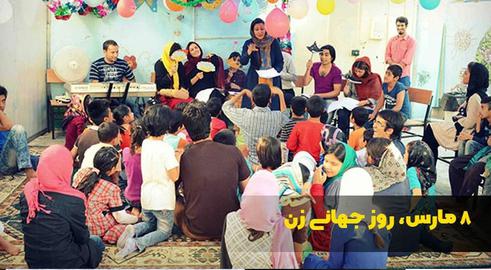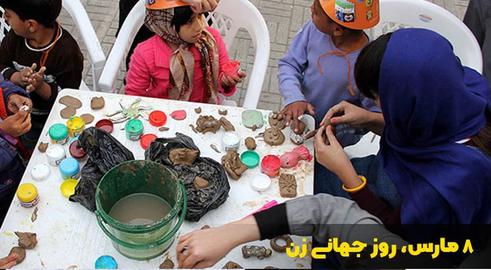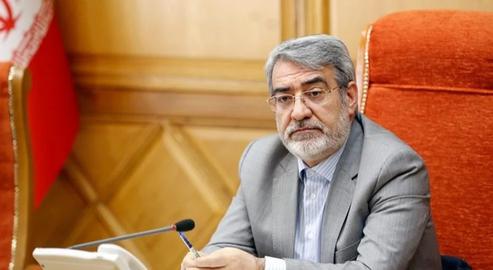"The working women who heard shed tears like a spring cloud. ‘Take us on Saturday,’ they said, ‘to talk to the judge.' But I said the judge wouldn’t listen to us either. These women will become unemployed; their children will join the garbage collectors and child laborers, and others will drop out of school."
This was the gut-wrenching testimony of Sima Hashemi, one of 10,000 previously active volunteers for the Imam Ali Society: a nationwide charity in Iran which was recently dissolved at the request of the Ministry of Interior and with the vote of Branch 55 of the Tehran Court of Law.
For decades now, the most critical activity of the Imam Ali Society has been to support poor and working-class children in the most deprived parts of Iran. At the time of its dissolution the NGO had served more than 6,000 working and formerly-abused children, along with 700 households headed by single mothers. With its 10,000 volunteers, mostly students and young people, the Imam Ali Society was one of the largest and most important non-governmental organizations in Iran propping up the government’s haphazard efforts to fight poverty in the country.
Ever since its dissolution was announced, a pivotal question has been asked over and over again on social networks and in public forums in Iran: what will happen to these women and children now? IranWire spoke to a former volunteer from the Imam Ali Society to find out more.
On March 4, 2021, the Iranian Ministry of Interior announced in a statement that based on so-called "public reports and opinions of the responsible regulatory authorities", the Imam Ali Society – full name the Imam Ali's Popular Students Relief Society –had "deviated from the statute in its activities and practices". For this reason, the statement added, the Ministry of Interior has demanded its dissolution.
Three days later, Zahra Abedini, deputy head of Iran’s Social Affairs Organization, attended a press conference in which she clarified that the reason for the Ministry’s complaint had been a “lack of transparency” on financial matters as well as two violations of statutory duties, including “anti-religious activities and insulting the Ahl al-Bayt, and political activities and issuing various statements”. She also cited the charity’s ongoing “disobedience” and non-compliance with official warnings to change its structure.
The charity’s lawyer, meanwhile, has rejected the accusations. “The Ministry of Interior,” he said, "filed a five-point petition to the court with lots of misspellings and factual errors, which did not provide for any legal action. We responded that all the activities of the Society were conducted within the framework of the law."
Anatomy of a Complaint
A lengthy verdict against the Imam Ali Society was issued by the court less than 12 hours after the hearing. But story of this tussle goes back to last summer. On June 21, the Revolutionary Guards’ Sarollah Headquarters filed a complaint against the Society and simultaneously arrested and raided the homes of its founder Sharmin Meimandinejad, head of media Morteza Kaymanesh, and deputy inspector Katayoun Afrazeh.
Ms. Afrazeh and Mr. Kaymanesh were both released a few days later, but Sharmin Meimandinejad, despite being unwell, was held in detention for 129 days. After the end of the interrogation period, he was released from Evin Prison on October 27, 2020 on a bail of 2 billion tomans [$83,000].
The IRGC was also said to be behind the complaint against the Society’s founder. Over the course of last summer, media close to the IRGC published material that seemed to corroborate this: Mashreq, for instance, called Meimandinejad a "supporter of sanctions" and “the head of a sect”.
It still remains unclear, however, why the head of the judiciary of the Islamic Republic felt the need to intervene personally. He claimed to Tasnim News Agency that “enemies”, through charities and associations, had “set up a network to influence various levels of public opinion." The judiciary is far from independent in Iran and appears to enjoy close ties with the security agencies as well as the ruling clerical caste.
The Record of the Imam Ali Society
According to its own website, the Imam Ali Society is a “completely independent” NGO that was first established in 1999, and officially registered in 2005. The organization, which focuses on charitable relief to lower-income children in Iran, states that it "respects human rights, equality, peace and freedom of religion, and all people, regardless of religion or belief, can become members of the Society."
The Imam Ali Society covers more than 6,000 children and 700 female-headed households, which it supports financially and socially through projects under predominantly religious names. The charity offers its services from 43 social work centers embedded in communities, called the Iranian Homes, in more than 15 Iranian provinces.
The NGO has also run educational projects and activities for children, and run workshops aiming to help their mothers find employment, as well as providing medical, psychological and dental care and food packages to those who need it most. It also famously organizes special events such as the Muslim Children project throughout the holy months of Muharram, the Kaaba Kariman, an outreach project linked to the birthday of the first Shiite Imam, and its winter project "Yalda in the alleys of poverty".
A former Imam Ali Society volunteer, who asked to be known as Shahin, told IranWire: “The Society first sought to gain a thorough understanding of the causes of and reasons for poverty, as well as seeking solutions on the ground and managing demand. We began our activities with a direct presence in the city suburbs. We took down the wishes of working children and children covered by the Welfare Organization, and tried to make them a reality.
"Because we saw that many of these children were from the suburbs, we started to establish help centers in the heart of these localities which were called the Iranian Homes. Over time, at the request of volunteers, the Society’s local arms expanded and volunteers became active in many provinces."
Shahin also said the Imam Ali Society has set up sports facilities aiming to alleviate the impact of social ills such as drug addiction. "We tried to make our services principled,” she said. “Children in these neighborhoods have easy access to drugs, but there is not so much as an empty field for them to play in, to put aside the other difficulties of their lives such as having to work and not having documentation. So we launched sports programs. We launched the Persian League, which was an athletics club for both girls and boys, and a football league for boys, and tried to create a positive identity for these children.
"We have learned from experience that relief and charitable work alone cannot be effective. On issues such as child addiction, child abuse, child marriage or the sale of children, we tried to address the situation by holding seminars, conducting research and inviting the authorities to join us. The Society’s pursuit of a child protection bill, which was finally passed this year after 10 years in the making, is one example of this."
This activist also says that the Imam Ali Society has long been aware of the plight of working-class mothers in the suburbs. It also implemented what it calls "Learning Houses”, facilities for teaching life skills and literacy to mothers and children alike, which host workshops aiming to empower women and help them build up entrepreneurial skills.
What Will Happen to the Charity’s Beneficiaries?
Ever since the scandal broke this month, countless activists and observers have demanded to know how these vulnerable mothers and children will be supported now. Thus far, no official body in the Islamic Republic has ventured to answer the question.
In fact, according to another volunteer, the Society’s work was downplayed in the court hearing. A judge in Branch 55 of Tehran's Court, they said, who was in charge of overseeing the case, had claimed that "the organization's activities were limited to one meal per day for children". Even were this drastic understatement accurate, it is not clear who would be tasked with providing this one meal a day to 6,000 children in the Society’s stead.
"With the revocation of the license,” Shahin says, “many children will drop out of school – because they are immigrants and do not have IDs cards, because they have been abused, or because their parents are not capable. Every summer, we dashed around to register these kids.”
The issue of children dropping out of school in Iran is both serious and apparently growing. According to some Iranian media reports, in the academic year 2019-2020, more than one million Iranian school-age children dropped out of school prematurely. UNICEF had previously reported that in the 2015-2016 academic year, 770,000 children between the ages of six and 16 had dropped out early.
This staggering figure was registered even after legal obstacles to refugee children studying had been removed, on the direct orders of Supreme Leader Ali Khamenei. Previously, many children with Afghan citizenship had been unable to enrol. Even after these adjustments were made, another UNICEF report in May 2018 found that half of Afghan children living in Iran do not attend school.
As such, many children without identity cards, who generally have Iranian mothers and non-Iranian fathers, find their only source of education in NGOs such as the Imam Ali Society. In these makeshift classrooms they can learn to read and write and mix with their peers, and perhaps find better job opportunities in the future as a result.
The consequences of the dissolution of the Imam Ali Society do not end here. Shahin is extremely worried about the closure of the sports and recreational facilities the charity had set up: even setting up one such green space required months of close collaboration with the Ministry of Sports and Youth. There has been no word on what will happen to these sites now, or who will operate them.
A Vital Link Combating Child Abuse in Communities
The Imam Ali Society has also played a pivotal role in identifying children at risk of serious violence in Iran, and following up on their situation in collaboration with the authorities. In the past its interventions have even led to the cancellations of parental custodies and children being taken into the care of the Welfare Organization.
"According to Article 66 of the Code of Judicial Procedure,” Shahin said, “NGOs have the right to inform and follow up on child abuse cases. True, our volunteer activists will not stop reporting these cases now due to their sense of social responsibility. But when the Association's license is revoked, other government agencies will not be able to cooperate as before."
Last July the Iranian parliament and Guardian Council finally passed the Child and Adolescent Protection Bill after a ten-year delay. In the same period, the Forensic Medicine Organization released a report indicating a 12.5 percent increase in reported child abuse cases in Iran. Among them were only a handful in which a responsible adult, such as a schoolteacher, a neighbor, or a local grocery store manager, had reported the abuse of a child directly.
The true extent of the impact of Imam Ali Society’s dissolution is not yet fully known. Its director, Zahra Rahimi Khameneh, has meanwhile taken to Twitter to express the charity’s own helplessness in the face of the situation. “Dozens of people have been asking me, what will happen to the children and families of the Society?” she wrote. “We did our best and were willing to serve. The question should be put to those who wanted to dissolve the Society; maybe they have some idea."
Related coverage:
The Government Shuts Down NGOs but Admits Its Failure to Help the Poor
Rouhani’s Government Shuts Down Charity Supporting Vulnerable Children
The Relief Organization that has Angered the Revolutionary Guards
visit the accountability section
In this section of Iran Wire, you can contact the officials and launch your campaign for various problems


























comments